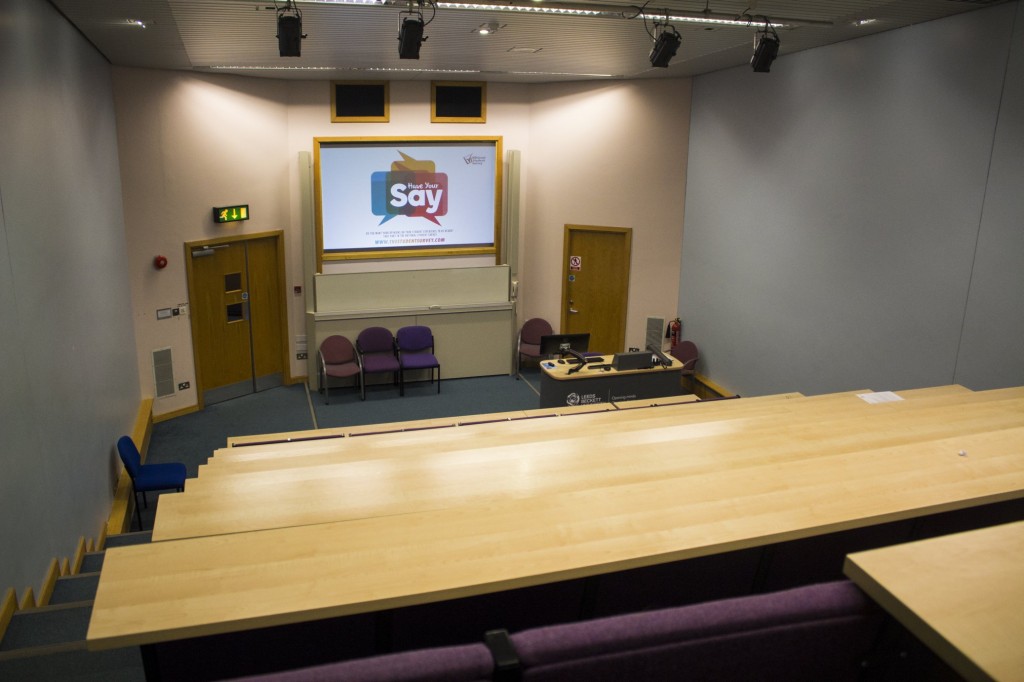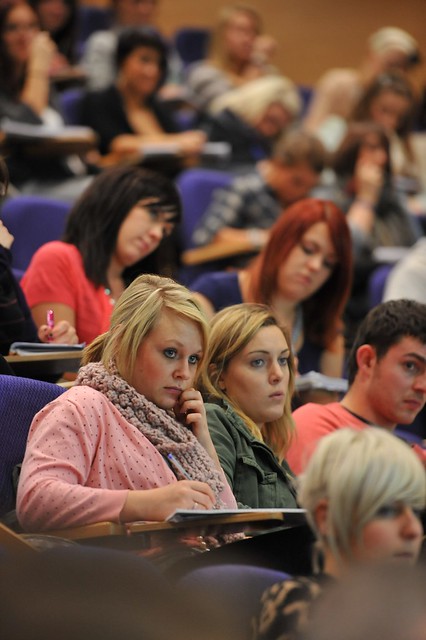Lectures at university can be quite different from lessons at school and college, particularly when you are taught in a big group. This activity will help you to make the most out of lectures.
Background
It’s hard to know what a lecture is like until you’ve been to one. Even if you’ve been to a public lecture or sample session as part of visiting your university, it’s not quite the same as the real thing. Depending on your course lectures may take different forms, some may be discussion based and interactive but often they are more formal and traditional with a tutor stood at the front of tiered seating talking through a powerpoint presentation with little or no involvement from the audience. The tutor will not wait for you to copy information from the slides as you may be used to from school or college and they may move backwards and forwards through the slides as they talk around the topic.
How could this affect me?
Keeping up with note taking, being in a big group and dealing with sensory stimuli can be both challenging and exciting – just like the content of lectures themselves. Many students really enjoy lectures as it’s a chance to learn more about a subject you’re really interested in from an expert in your field. However, when in lectures for your course you will need to find some way of listening to the lecturer whilst also making a record of what they are saying so that you can refer to it later.
What to do next?
Find the strategies that work for you
Practical tips
Finding an effective method of note taking in lectures will be an important skill to learn at University. Our Skills for Learning team may be able to help you to find a way that works for you.
Taking notes
- You can’t really write down everything that is said, even if you have amazing shorthand skills. Though developing your own shorthand and abbreviations isn’t a bad idea (see this Guardian article).
- Don’t try to copy exactly what’s on the slides – slides are often uploaded to the virtual learning environment (MyBeckett at Leeds Beckett) and/or printed as a handout. If the slides are available prior to the lecture you may want to print them out in advance or download them on your laptop so that you can annotate them during the lecture.
- Some tutors may record their lectures and share them on MyBeckett after the lecture. If you find it helpful to re-listen to the lecture but your tutors choose not to record them, you may find it useful to record them yourself, either using your phone or you can borrow a recording device from the library. If you are eligible to apply for Disabled Student’s Allowance, you may receive equipment through this to assist with notetaking.
- After the lecture you may want to write what you think about the contents of the lecture, as well as the main points of what is said. This will help you to develop critical thinking, which is another important skill.
- Mind mapping, either via software on your laptop or drawn by hand, can be a really useful way of showing how ideas are linked and might suit your way of thinking better than writing down full paragraphs or even bullet points. Skills for Learning have a great section on this (you will need to log in if you are off campus) and mindmapping software and training to help you to get the most out of the software is available on campus.
Timing
- Lectures don’t always start on time, but it’s better to assume that they will. If you can, arrive early as you will not miss anything and you can get settled before it begins. However, you should be mindful that there will often be classes scheduled in the room before your class so you will not always be able to enter until it is time for your class to begin.
- Sometimes being late is unavoidable – just come in as quietly as you can and sit in the first available seat (even if this is not where you would usually sit) – it might feel intimidating at the time, but most people are not going to mind and it’s better not to miss out completely. The same if you need to leave earlier than planned.
- Other students may well arrive late or need to leave early themselves. This can be distracting, but it’s okay to do this at university, as everyone has things going on outside the course.
- If you arrive too early for your session, the previous lecture may still be going on, and/or you can get caught in the crowd of people leaving. If you can, spend some time around your lecture theatres close to lecture changeover time and familiarise yourself with the timings and where entrances and exits are.
- If you have time, go to the loo first! It sounds obvious, but lectures are often two or three hours long and not all of them have breaks (and if they do, there can be queues). You don’t want to be thinking about it throughout the session or having to run out at the end.
- If you are one of the first people into the lecture theatre, you can choose where to sit – you might like to sit on the end of a row near the aisle so you can get out quickly if you need to leave.
“I left lectures, if the commotion became unbearable.” (student, Autism&Uni surveys)
If sitting near the front helps you to concentrate, sit there.
Signing in
Lectures and seminars tend to have sign-in sheets or may have an electronic system so make sure the sheet gets round to you and you pass it on to the next person. If you don’t catch it during the lecture, go to the front of the lecture theatre or seminar room at the end to sign the register.
Question time
- There will often be an opportunity to ask questions in a lecture – either the lecturer will ask if there are any questions during the session or there will be specific time left aside for this at the end. If there is a specific time write your question down and save it for later.
- If you have multiple questions about the lecture topic, the research you have been undertaking or if you would like to ask about your own assignment, it is recommended that you ask privately at the end of the lecture if your tutor sets aside time for this or, email your lecturer or arrange an appointment with them.
Telling the lecturer about your autism
“In first year I missed a lot of lectures and also would sometimes have to leave during one as I would have severe anxiety due to having to sit surrounded by people, not moving and often in a room with no windows and unnatural light. Lecturers were aware this could be the case and so did not mind and knew I was not being rude.” (Fern, final year student, Autism&Uni interview)
It can be beneficial to tell your lecturers know (in person or via email) that you are autistic and how it affects you – even if you think they already know as this enables you to explain in your own words. Read the rest of Fern’s interview and the toolkit section on Telling people at university about your autism, if you haven’t already done so.
Questions to think about
- Do you prefer to read handouts online or on paper?
- What helps you to focus on someone speaking, like a lecturer, when a lot is going on?
- Would it be useful to record your lectures to enable you to return to the lecture and complete your notes or re-listen at a later point?
- Do you have a preference of where you would like to sit that helps you to concentrate and follow the lecture?
- Do you feel comfortable asking the lecturer to use the microphone if everyone else says they’re OK without it or the lecturer starts speaking quietly?
- If you need to leave a lecture early, either because you have an appointment or you need to go somewhere quiet for a while, how will you sort that out in advance?
- Do your lecturer and fellow students know that you are autistic? Do you think it might help if they did know?


 Back
Back 



